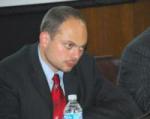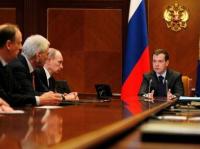
Vladimir Kara Murza
The abolition of gubernatorial elections by Vladimir Putin in 2004 was widely seen as the final act in dismantling Russia’s short-lived democratic system. Their restoration in 2012 must be viewed as the most important achievement of the “Snow Revolution”—a series of pro-democracy protests that swept the country between December and March. In September 2009, President Dmitri Medvedev promised that direct elections for regional governors will not return “in a hundred years.” In May 2011, he shortened the time span to “10 or 15 years.” On December 22, 2011—twelve days after the first 100,000-strong anti-government rally in Moscow—Medvedev announced the reinstatement of elections. The law, signed this Wednesday, will take effect on June 1st. Any gubernatorial vacancies occurring after that will have to be filled via the October 14th vote.
Article: http://www.worldaffairsjournal...
The Kremlin tried its best to reduce the effects of the forced concession. While rejecting the idea of giving the president the power to remove any gubernatorial candidate from the ballot, the bill’s drafters introduced the so-called “municipal filter”: anyone who wants to run for governor must collect signatures from between 5 and 10 percent (the exact figure will be decided by each region) of municipal legislators or mayors. Given that, outside of the large cities (notably Moscow, where Kremlin opponents control some 30 percent of the seats on municipal assemblies), local elections are rubber-stamps, and legislators usually follow orders from the executive, this requirement presents a serious hurdle for opposition candidates. It should not be surprising that one of the most enthusiastic proponents of an electoral “filter” is Valery Shantsev, the Kremlin-appointed governor of Nizhny Novgorod—the region that has, on four separate occasions, elected the now-opposition leader Boris Nemtsov to the governorship or the federal Parliament. Nemtsov has not ruled out seeking the governor’s mansion once again.
Beside the “filter,” the regime is taking a more direct route to spare itself the humiliation of defeat. Since announcing the reform in mid-December, Medvedev has, using his expiring power of appointment, replaced 13 regional leaders, including the governors of Yaroslavl (where United Russia party received 29 percent of the vote in December’s parliamentary elections), Kostroma (31 percent), and the Moscow Region (33 percent). Voters in these areas will not get a say on their government for another four or five years. As of now, seven regions are scheduled to hold gubernatorial elections on October 14th. But after a recent Kremlin leak that polls will be held in a maximum of “three to five regions,” more appointments can be expected in the next four weeks.
There is, however, another side to this story. Fewer elections will mean more poll monitors and journalists for each one—and that invariably reduces the scope of state-sponsored fraud. As witnessed by the recent slate of defeats for the Kremlin’s mayoral candidates, even manipulated elections present problems for the regime. Carnegie Endowment expert Nikolay Petrov has observed that the Kremlin can still lose even if it disqualifies major challengers: “What happened in [the recent mayoral vote in] Yaroslavl … was not a victory for a strong opposition candidate, but a defeat for the candidate of the Kremlin.” As for the possible disqualifications of popular gubernatorial candidates, such moves may reignite anti-regime protests across the country—the very possibility the December concessions were designed to prevent.

























